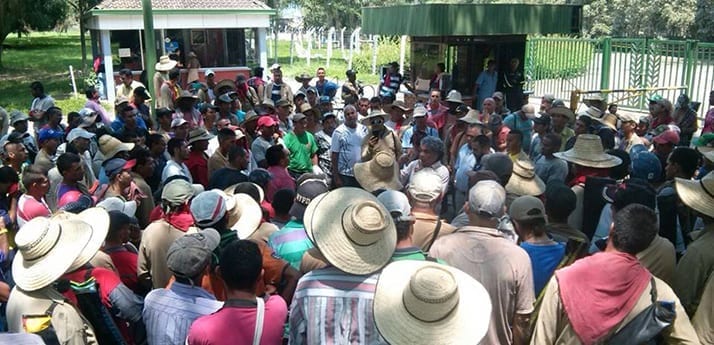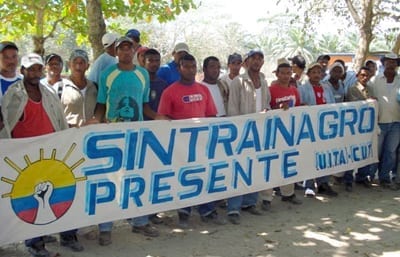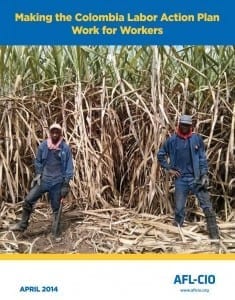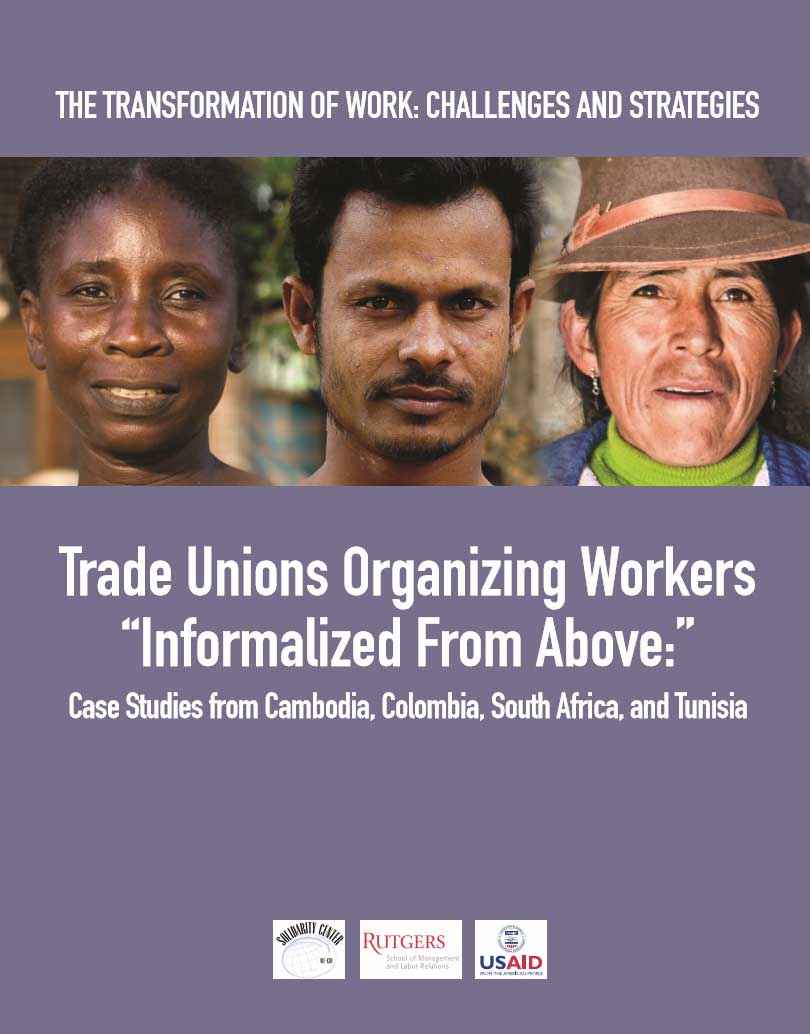
Mar 11, 2015
SINTRAINAGRO, affiliated with the global food, farm and hotel union IUF, won direct, permanent contracts for cane cutters at the Risaralda mill in western Colombia’s Cauca Valley. The breakthrough agreement was signed on March 5 after 500 cane cutters launched an indefinite strike on March 2 and were brutally attacked by state anti-riot forces and company guards the following day. The assault resulted in dozens of injured strikers and left local union leader Carlos Ossa Trejos in critical condition.
Agreement was reached following intensive negotiations involving the union, the national executive of the CUT and the Ministry of Labor.
Prior to this agreement, cane cutters with many years of work were being employed on limited fixed-term contracts, and mechanization has further depressed wages. The agreement commits the company to providing open-ended, permanent employment contracts “in accordance with ILO (International Labor Organization) decent work standards” to all SINTRAINAGRO cutters, who will be employed by a Risaralda subsidiary to be established within 10 weeks. The company cannot fire or refuse to hire strikers, must “ensure the application of the principles of equality and non-discrimination” in assigning work and will establish mechanisms for ensuring payment of social security contributions, among other measures.
“This government wants to create an atmosphere of terror against anyone who dares to raise their head. However, workers and their families are losing their fear and defending their right to employment and decent living conditions” said SINTRAINAGRO’s Mauricio Ramos. “Once again it has been shown that mobilization, pressure and peaceful struggle are the tools for claiming rights.”
Crossposted from the IUF.

Mar 2, 2015
Gunmen fired on a car carrying Guillermo Rivera and Medardo Cuesta, president and treasurer, respectively, of the Colombian rural workers union SINTRAINAGRO, as they were meeting February 24 with members in Valle del Cauca.
Their vehicle was hit by bullets but the two were unharmed thanks to the reaction of Cuesta’s bodyguard. The National Protection Unit has recently denied Rivera’s requests for protection, citing lack of resources. Cuesta was granted protection while visiting the high-risk Valle del Cauca, but union leaders must be able to safely travel the entire country. The International Union of Food, Agricultural, Hotel, Restaurant, Catering, Tobacco and Allied Workers’ Associations (IUF) has written the Colombian authorities to denounce the attack and again demand adequate protection for threatened union leaders.
SINTRAINAGRO, which organizes banana, palm oil, sugar and flower workers, has had some 750 members and leaders murdered by paramilitary organizations over past decades. The union has expressed support for the ongoing peace negotiations between the government and the rebel group, FARC, but also insists on an end to the decades of impunity for those responsible for years of systematic violence against the labor movement.
This is a crosspost from IUF.
Apr 8, 2014
 The governments of Colombia and the United States signed the Labor Action Plan (LAP) three years ago this week. The plan was intended to provide a road map for Colombia to protect internationally recognized labor rights, prevent violence against labor leaders and prosecute the perpetrators of such violence.
The governments of Colombia and the United States signed the Labor Action Plan (LAP) three years ago this week. The plan was intended to provide a road map for Colombia to protect internationally recognized labor rights, prevent violence against labor leaders and prosecute the perpetrators of such violence.
As a new AFL-CIO report shows, systemic violence against Colombian workers continues and workers still face persistent employer abuses. Palm workers like Miguel Conde of the union SINTRAINAGRO at the Bucarelia plantation initially were hopeful, but the LAP profoundly failed to deliver on its promises. In the blog, “Make the Colombia Labor Rights Action Plan Work for Workers,” the AFL-CIO Now writes:
“Like many Colombian workers, palm workers at Bucarelia were increasingly hired on as temporary subcontracts. Subcontracting prevents workers from forming unions, gets employers out of paying social security and other benefits due to direct hires and makes it easier to fire anyone who complains or supports unions., the LAP was supposed to end abusive subcontracting of those doing a company’s core work. When workers at Bucarelia learned about the promised reforms, and that the palm sector had been specifically identified in the LAP, they launched an organizing campaign, thinking they had a way forward.
Feb 28, 2014

Some 127 labor activists took part in the second Afro-Colombian Labor Council conference in Bogotá. Credit: Rhett Doumitt
Ready to power forward with new grassroots organizing and mobilization outreach, 127 Afro-Colombian labor and community leaders met in Bogotá in recent days for the second national forum of the Afro-Colombian Labor Council (CLAF).
During the two-day gathering, Afro-Colombian labor rights activists shared the organization’s successes—among them, the amazing growth of the Domestic Service Workers’ Union (UTRASD) from a locally based group in the city of Medellín to a nationwide organization with 250 women.
A quarter of Colombia’s population is Afro-descendant, yet Afro-Colombians comprise more than 50 percent of the country’s poor. Formed in July 2012, CLAF is the first national organization to explicitly tackle the exploitive working conditions that most Afro-descendants suffer. Since its launch, CLAF has expanded from a national coordination board to an organization with 10 local chapters across Colombia, including Bogotá, Cartagena, Santa Marta, Urabá, Valle del Cauca, Medellín and Buenaventura.
“When you build things collectively, then everyone takes ownership of them,” said Agripina Hurtado, president of the CLAF executive board. “We need to promote the vision of where we are going—grow, connect and advocate around the challenges facing all Afro-Colombians.”
The non-governmental organization Escuela Nacional Sindical (ENS) presented research on working conditions in predominantly Afro-Colombian economic sectors, such as construction, domestic work, and ports, where ENS researchers found extreme levels of labor informality. Afro-Colombians are far likelier than other Colombian workers to earn less than the minimum wage and to be employed in jobs where they cannot form unions to improve their working conditions.
Leaders and activists at the meeting, held with the support of the Solidarity Center and the International Labor Organization (ILO), developed a three-pronged work strategy focusing on organization building, public policy advocacy and formalization of work.

Oct 24, 2013
Four case studies examine successful union organizing among workers whose jobs have been privatized, outsourced or contracted out. This Solidarity Center report is part of a multiyear research project, funded by the U.S. Agency forInternational Development, to study the informal economy, migration, gender and rule of law together with research partners Rutgers and WIEGO.
Download here.





